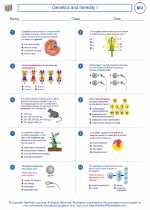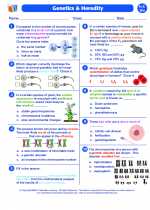Water Balance
Definition: Water balance refers to the regulation of the amount of water in the body to maintain homeostasis. It involves the intake, absorption, distribution, and excretion of water to ensure that the body's fluid levels remain within a healthy range.
Factors Affecting Water Balance
- Fluid Intake: This includes drinking water, as well as the water content of foods and beverages consumed.
- Fluid Loss: This includes water lost through urine, sweat, feces, and respiration.
- Regulation by Hormones: Hormones such as antidiuretic hormone (ADH) and aldosterone play key roles in regulating water balance by influencing the reabsorption of water in the kidneys.
- Thirst Mechanism: The sensation of thirst prompts individuals to drink water, helping to maintain water balance.
Importance of Water Balance
Water balance is crucial for various physiological processes, including:
- Regulation of body temperature
- Transport of nutrients and oxygen
- Lubrication of joints
- Protection of tissues and organs
- Elimination of waste products
Disruptions in Water Balance
Imbalances in water levels can lead to health issues such as dehydration or overhydration. Dehydration occurs when the body loses more water than it takes in, while overhydration occurs when the body retains too much water. Both conditions can have serious consequences for overall health and well-being.
Study Guide
When studying water balance, it's important to focus on the following key areas:
- Understanding the processes involved in water intake and absorption
- Learning about the role of the kidneys in regulating water balance
- Exploring the influence of hormones on water reabsorption
- Recognizing the signs and consequences of imbalances in water levels
- Identifying strategies for maintaining proper water balance
Additionally, practicing with case studies and real-life examples can help reinforce your understanding of how water balance impacts overall health and wellness.
.◂Biology Worksheets and Study Guides High School. Genetics and heredity I

 Worksheet/Answer key
Worksheet/Answer key
 Worksheet/Answer key
Worksheet/Answer key
 Worksheet/Answer key
Worksheet/Answer key
 Vocabulary/Answer key
Vocabulary/Answer key
 Vocabulary/Answer key
Vocabulary/Answer key
 Vocabulary/Answer key
Vocabulary/Answer key
 Vocabulary/Answer key
Vocabulary/Answer key
 Vocabulary/Answer key
Vocabulary/Answer key
 Vocabulary/Answer key
Vocabulary/Answer key
 Vocabulary/Answer key
Vocabulary/Answer key
